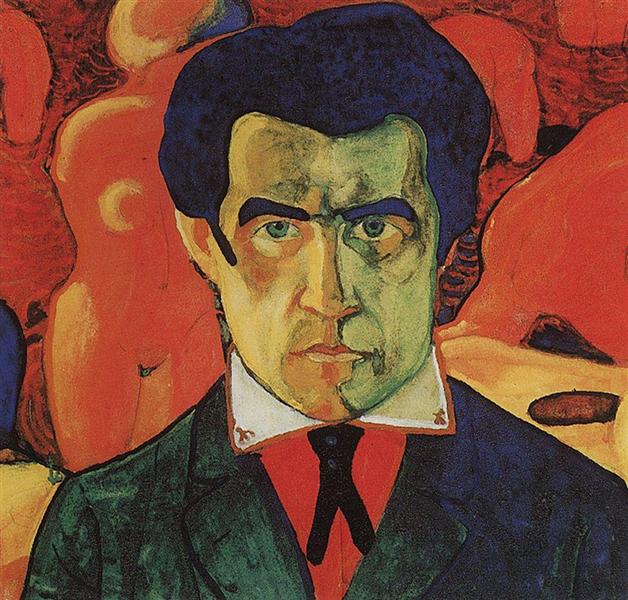Description
Kazimir Malevich, a core figure in the Russian avant -garde and precursor of suprematism, offers us in its "self -portrait - 1910" a work that, although early, already reveals the concerns and aesthetic explorations of its creative genius. This painting, made before its full immersion in geometric abstraction, gives us a window towards its artistic evolution and allows us to appreciate important aspects of its visual language in gestation.
At first glance, the self -portrait captures our attention for its vertical format and the imperishable centrality of the subject, namely Malevich himself. The artist presents himself in a frontal pose, with a serious countenance, which transmits a mixture of introspection and challenge. This direct and almost hieratic representation of itself could be understood as a manifestation of its future determination to break with the established aesthetic canons.
The composition of the portrait is remarkable for its economy of elements and concentration in the central figure. Malevich paints himself with a dark jacket and a white shirt, creating a strong contrast that highlights his face and hands. The bottom, clean and stripped of any decorative element, reinforces the importance of the subject within the pictorial space. This compositional minimalism already hints its future orientation towards suprematism, a movement that would completely abolish figuration for the pure representation of shapes and colors.
The use of color in "self -portrait - 1910" is subtle but effective. Outside tones and a predominantly cold palette predominate, with a limited incursion into warm nuances. Malevich's face, with ocher and brown tones, contrasts with the chromatic sobriety of his clothing and the background. This color game helps to emphasize the figure of the artist, isolate it from the background and allow a more intense contemplation of its expression and presence.
An intriguing aspect of the portrait is the Malevich technique. The brushstroke is loose, almost impressionist, which is particular when comparing this work with its subsequent works whose geometric accuracy will be the norm. This technique gives a lively texture to the portrait, causing the viewer to feel a work that breathes and throbb the energy of its creator.
Although "Self -portrait - 1910" does not have the same renown of supreme works as "black square" (1915), it is essential to understand Malevich's trajectory. This painting reveals to an artist at a turning point, where he still dialogues with the figuration and traditional principles of the portrait, but already shows signs of his tireless search for a more pure and essential visual language.
In the historical context, this self -portrait must be seen as a window to the ferment period prior to the Russian revolution, where avant -garde artists explored new forms of expression in search of new spiritual and aesthetic dimensions. Malevich, in particular, will play a fundamental role in this movement, and its first works, such as this self -portrait, are testimony of their personal and artistic evolution.
Thus, "Self -portrait - 1910" by Kazimir Malevich is more than a mere representation of the artist; It is a living document of a crucial moment in his career and in the history of art. It invites us to reflect on the process of transformation of a creator who challenged and redefined the borders of art, establishing an intimate and direct connection with those that we contemplate today its pictorial legacy.
KUADROS ©, a famous paint on your wall.
Hand-made oil painting reproductions, with the quality of professional artists and the distinctive seal of KUADROS ©.
Art reproduction service with satisfaction guarantee. If you are not completely satisfied with the replica of your painting, we refund your money 100%.

